Kids in Taprooms: Good or Bad for Business?

September 20, 2021
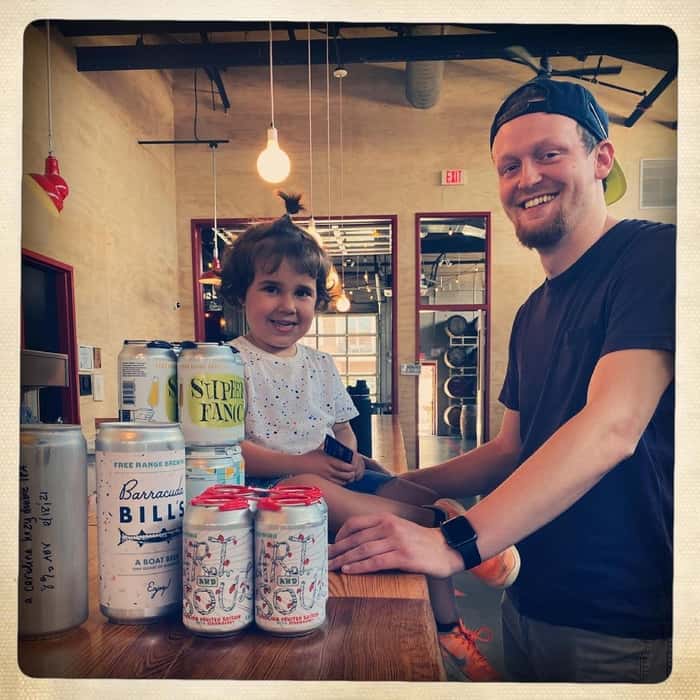
Opening a brewery can have a profound effect on both the local economy and community. Historically, beer gardens have been a gathering space, providing people a home away from home.
With this idea in mind, breweries have grown from welcoming just adults to being spaces for families too.
While being inclusive is an important aspect of any business, it may not be right for every brewery. How do you decide?
It’s important to understand all of the factors when determining if you’d like to allow kids in your brewery.
Here’s what we’ll cover in this article:
What We’ll Cover in This Piece:
The Advantages of a Kid-Friendly Brewery
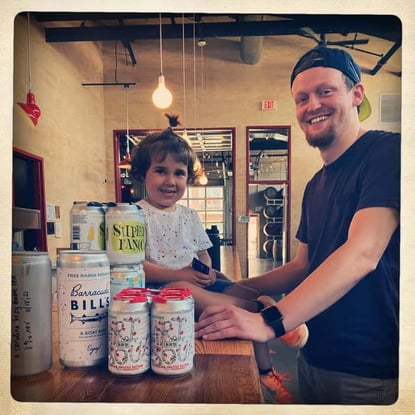
There are many advantages to catering to children in your taproom.
“We are really focused on creating community and children are a part of that community,” says Sarah Alexander, Co-Owner of Free Range Brewing in Charlotte, NC. “For parents, there’s the idea that just because you have children doesn’t mean you don’t enjoy going out with friends in public places. We wanted to provide that space for parents to be in public without feeling that their children were a burden or uninvited.”
But, the reasoning goes beyond inclusion.
“We also think it’s really important for kids to see adults engage in responsible drinking. We wanted to incorporate this in a healthy and safe way,” says Alexander.
A former art teacher, Alexander thought deeply about the implications of excluding children from brewery culture.
“Not wanting kids in breweries is a very American idea,” says Alexander. “In other countries people take their children with them everywhere. To allow children in a brewery normalizes the activity of drinking and not getting drunk. If all breweries were to be childfree then drinking becomes taboo, creating problems for children when they get older.”
There are also the positive economic implications of incorporating children into your business model.
“The biggest thing is that if you create a kid-friendly environment, you’re going to have a bigger population of customers,” says Mo Bentley, General Manager of Jack’s Abby Craft Lagers Beer Hall & Kitchen in Framingham, MA. Located in a suburb of Boston, the new Jack’s Abby location quickly figured out that they would miss out on a huge customer pool if they didn’t include some kid-friendly aspects to the business.
Inviting families and children into an establishment creates community without alienating potential customers. It can be a win-win for everyone. With careful planning and an eye on your business model, the inclusion of families broadens your customer base. It just takes a few additions and accommodations.
Is Welcoming Kids Right for Your Business?

Ultimately, you need to decide whether welcoming kids to your taproom fits in with your brand and with your location. Are you in a very residential neighborhood? Then you might be missing out on patrons if you decide to only allow over twenty-one-year-olds. Conversely, are you located downtown in a major city? There it might make more sense to be adult only.
“Read the room,” says Kat Leggett, PR & Events Manager with Jack’s Abby Craft Lagers and Springdale Beer Co. “Figure out what is going to work in your community. If you’re in a downtown luxury apartment, it would make more sense to be adults only versus where we are in a Boston suburb. It’s about figuring out what’s needed.”
Similarly, how do kids fit into your mission and values? As business owners do you have a family yourself? If so, it might just make more sense to add child-friendly features into your taproom. Because it fits best with your brand.
In fact, if you are a family-owned business, you could even take extra steps to cater to children. Adding additional family-friendly touches such as toys or books will attract parents and their little ones, giving you access to a larger clientele.
For example, whn Alexander and her husband, Jason, opened Free Range Brewing in 2015, they already had two young children. Both of the youngsters craved entertainment while their parents brewed and ran the operations of a taproom. So Sarah and Jason built a play area complete with a bookshelf, a chalkboard wall, and shelves of toys.
“We thought, Well, we are going to be working here and we want to spend our time here and want our kids to enjoy it. If it helps out other parents, all the better,” says Alexander.
Other breweries position themselves somewhere in between a kid- and adult-friendly space during certain hours or days.
Dairelyn Guzman and Jason Glunt, co-founders of Salud Cerveceria and Salud Beer Shop and the parents of two children, take extra measures to welcome children while the sun is up.
During the day, Glunt makes sure his staff avoids the heavy hip-hop music often featured at night. This more family-friendly approach attracts parents with kids to stop by for a beer in the afternoon or during the weekday.
But at night the taproom eases into a more grown-up environment.
“We understand families will come in…[so] the vibe changes from day to night,” says Guzman. “Later in the day we switch back to the music people expect from us and it eases into a more adult-centric space, even though parents may bring their kids in around seven or eight o’clock. On weekend nights, though, we have a bouncer to ensure no one under the age of twenty-one enters.”
On the other end of the spectrum some spaces may not be suitable for children under any circumstance. Salud’s NoDa neighbor, The Blind Pig, features an adults-only arcade with a “21 and over” by the door, making it clear that their establishment is not for children.
The only way to decide which approach is best for you is to understand your brand and your community.
How to Make Your Taproom Kid Friendly
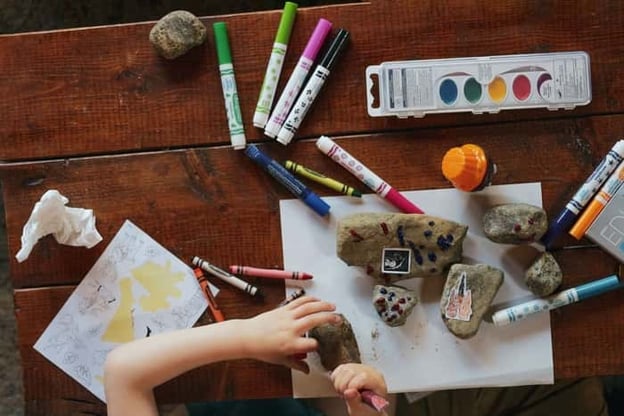
Welcoming families into your taproom means thinking through accommodations for children and guardians alike. Here are a few considerations:
Furniture
“When we opened up, we made sure we had all the basics,” says Alexander. “It’s important to have something the kids will enjoy and the parents will feel good about.”
Part of their upfitting meant having high chairs and kids’ cups on hand as well as step stools and changing tables in the bathrooms.
At Smartmouth Brewing Co. in Norfolk, Virginia, the brewery includes a stroller parking area for local families.
Games
Games in general are a great way to entertain kids. Even if it’s not a full-on play space like at Free Range, board games or coloring books keep kids busy while your adult customers enjoy a drink.
Food and Beverage
When Jack’s Abby Craft Lagers opened their Beer Hall & Kitchen in a Boston suburb, it was clear families would be part of the equation. The brewery wanted to make sure it had a few creature comforts on hand.
“We were moving into a family-centric community,” says Bentley. “We wanted to build a welcoming community and knew kids would naturally be a part of that.”
For example, the Beer Hall & Kitchen features a kids' menu as well as coloring pages on hand to keep kids engaged at the table.
Additionally, consider putting a few child-friendly beverages on your menu. The Alexanders worked with Jamie Swofford of Old North Shrub to create alcohol-free beverage options beyond juice and kombucha. Other places like Newgrass Brewing in Shelby, NC, offer Blue Sky sodas, an organic alternative to more commercialized sodas.
Events
Consider designing a few events to attract families. Or at least adding kid-friendly elements to all or part of your festivals.
During their ten-year anniversary and Oktoberfest, Jack’s Abby included a family-friendly day. On Sunday the brewery promoted face painting and flower crowns to attract more parents with their kids.
Additionally, the brewery is open to hosting kid-friendly events in their private space.
“We’ve had families host first birthday parties,” Bentley says. “We’re a family-owned business so we understand the need for these types of spaces. Breweries are fun. You want to bring your kids with you and share those experiences.”
At Free Range, Sarah leverages her art background to create one-time or even weekly events catered to children.
“We thought of all different ways to engage with families with space. At one point we had the library come weekly for story time and for our first two or three anniversaries we worked with a local organization for kids’ activities focused on crafts made with reusable items,” says Alexander. “We’ve also worked with a local science museum, Discovery Place, to host events.”
Events are an easy way to incorporate kids into your brewery.
The Challenges of Kid-Friendly Taprooms and How to Set Boundaries
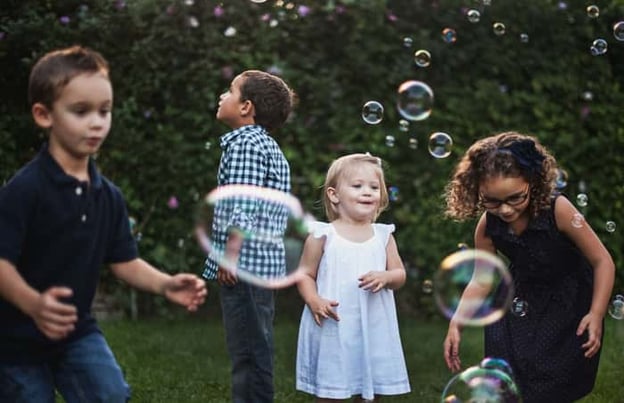
Of course, there can be challenges to allowing kids in a taproom. Parents can become overly comfortable and let their guard down. And children can be overly loud and energetic. There are safety concerns and you want to keep your other customers’ experience in mind as well.
“Typically, the parents are doing a really good job,” says Alexander. “[But] kids are humans and need space and sometimes it's a little bit bigger and a little bit louder.”
So what do you do to prepare for when things do go awry?
As a business owner it’s important to communicate your boundaries and rules to your patrons.
Here are a few areas where you might need to make and clearly post rules regarding kids:
Outdoor Areas
Outdoor areas are great for kids—there’s plenty of space to run around and move—but be aware of common challenges here. Children are much more likely to take advantage of these open spots by running and playing.
You might want to consider implementing a no-running policy, much like a public pool, or even instituting a specific “running zone” that sets clear parameters where kids have the freedom to move their legs.
“Every restaurant probably deals with kids going wild,” says Bentley. “Our floorplan is very open and the beer garden outside has a turf area with cornhole. Some parents may think, I’ll send kids over there and drink with friends. We think it's great they feel comfortable, but sometimes we have to step in and control the situation. We want to make sure kids are supervised at all times and that all guests feel comfortable, regardless of whether or not they have children.”
Indoor Areas
If your indoor space includes a play area for kids, like at Free Range, those spaces will probably need a specific set of rules too.
“We’ve made changes to adjust some of the things we realized we needed to change right away, like having less toys and certainly less rolling toys,” says Alexander. “Some parents clean up after themselves, some do not. It was surprising in the beginning, so our interpretation of that is, Wow, they must feel really comfortable and must have had a really good time.”
Communication
Overall, the biggest consideration here is to make sure you clearly broadcast your standards to your patrons. And when communicating these rules, remember that parents are doing the best they can with their children in public. While some may take advantage of this hospitality, most do not wish to be a disruption. With that in mind, it’s important to give parents the benefit of the doubt. They’re people too!
The best thing to do is to just be transparent. If you don’t want children wildly running around because it will disrupt other guests, say so. Make that a rule and post it clearly in your taproom.
Some may choose a sign, like “Children are welcome but must be seated,” while others go even further with a list of rules for children.
Understandably, this can be a tricky line to toe.
“When I’m out with my family and see a sign that is really in your face, it feels a little abrasive and off putting. Just say you don’t want kids at your brewery,” says Guzman.
If you think these hurdles are too much to overcome, then it might be best to bypass being a kid-friendly taproom.
But if you do decide to allow kids, the way you communicate with families will be absolutely crucial. You should personally approach any conversation with a parent with respect. But most importantly, you need to also train your staff on how to maintain a respectful and positive dialogue with families in any situation.
The Importance of Educating Your Staff
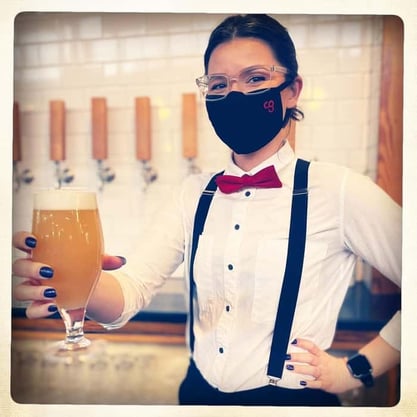
It is very important to make sure your staff feels empowered talking to families who aren’t following your established rules. Similar to cutting off an adult who has had too much to drink, bartenders and servers should be comfortable respectfully broaching these conversations.
It may be a bit awkward, especially for those without children or experience with kids, but getting all of your staff on the same page is important for establishing your business’ boundaries.
Staff meetings are a great time to address some of these issues. Have your crew roleplay different situations and set guidelines on how to deal with them. This can be a sensitive subject for both staff and guests. So having clear guidelines cuts down on potentially awkward or negative encounters. Plus, proper training will empower everyone involved to work towards a positive outcome.
Teach your staff positive communication language such as switching out negative words for positive. For example, instead of your team using the phrase, No running!, try instructing them to say, This is a walk-only zone. Additionally, it can be helpful to train your team to redirect by offering a coloring sheet or other activity to children to give them an activity they can enjoy while sitting down.
While it is not your often-busy staff’s job to provide childcare, it is vital for them to remain as neutral and helpful as they would in any other challenging customer situation.
So, Should You Be a Kid-Friendly Brewery?
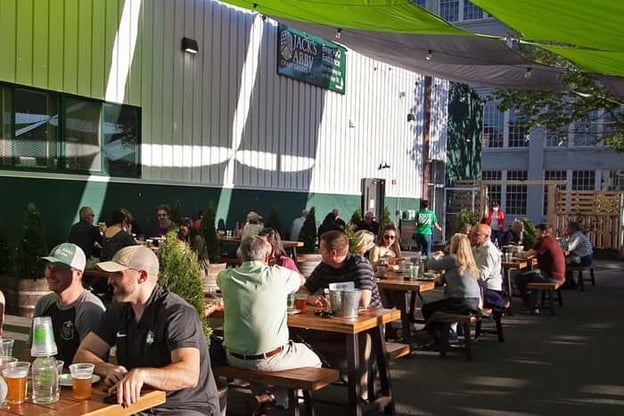
(Photography courtesy of Jack’s Abby Craft Lagers)
The decision is ultimately yours. Take into consideration your surroundings and your values as a brand. Allowing kids in your taproom may appeal to a larger clientele and attract more families, increasing your presence in the community and simultaneously your bottom line.
On the other hand if it isn’t a good fit for your business then you shouldn’t force it.
If you do decide to allow young ones into your taproom be prepared by setting boundaries and properly training your staff.
It can be little steps like these that will make a big impact on your business.
“At the end of the day, parents are people too, and we want them to feel respected,” says Alexander. “This is all a part of keeping people safe, showing them they are welcome, and creating a community space that openly welcomes people from all walks of life.”
Improve Your Brewery Production
Ollie is the platform built by brewers, for brewers™. Increase brewery productivity and sell more beer. Everything you need in one place.
